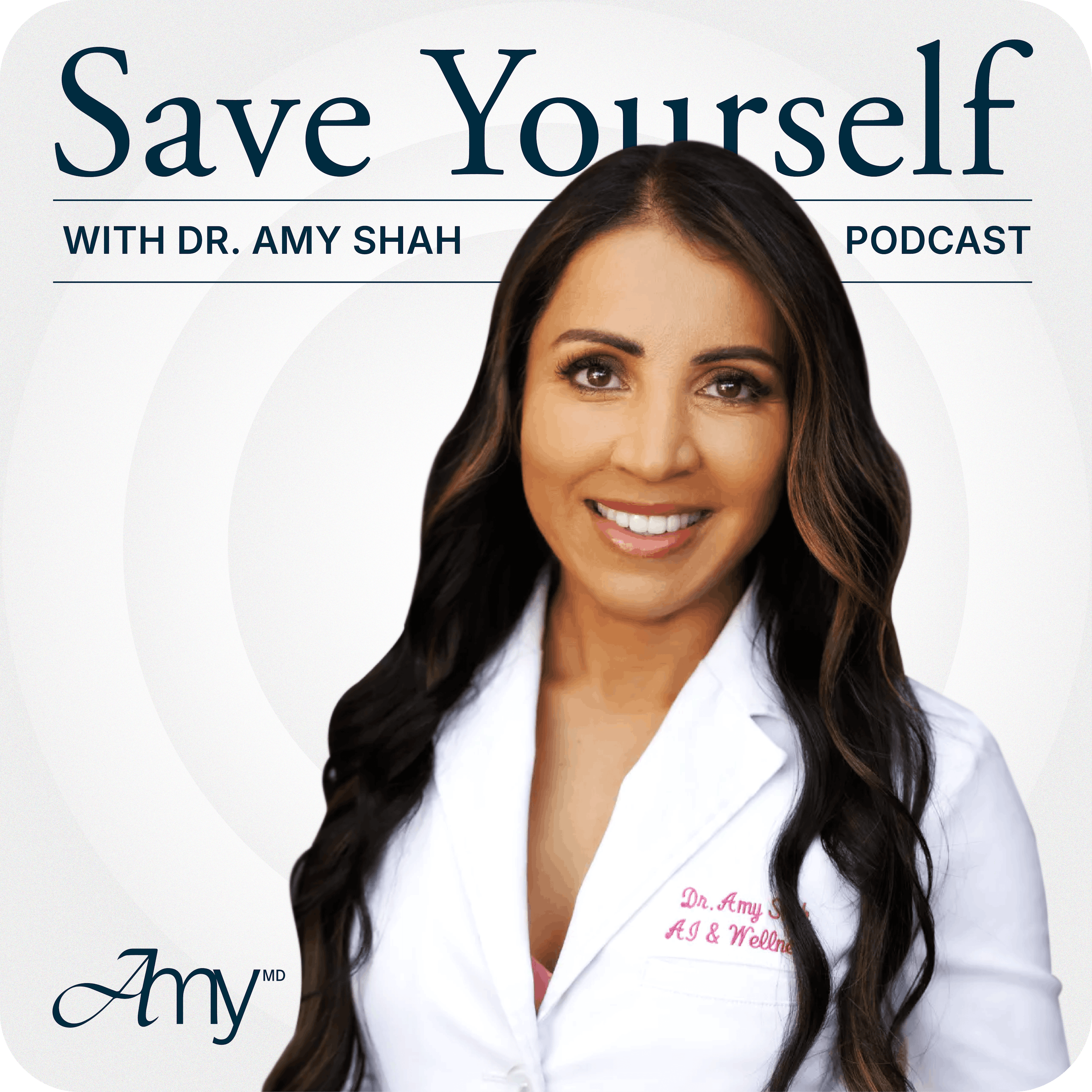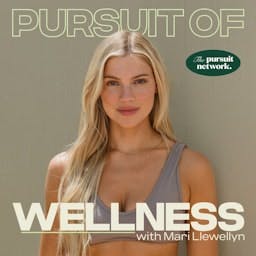.jpg)
Mindfully Integrative Show
Welcome to the Mindfully Integrative Podcast! We are dedicated to featuring inspirational and successful individuals who have embraced mindful investing to achieve optimal integrative wellness. Our podcast dives into all aspects of mindfully incorporating integrative functional health into our lives, aiming to help create a more balanced and fulfilling life. New episodes are released every Friday and cover a wide range of informative and entertaining topics, interviews, and discussions.
We explore a mindful approach to the mind-body connection with guests discussing various topics in integrative holistic health. This includes areas such as whole health, functional medicine, spiritual health, financial health, mental health, lifestyle health, mindset shifts, physical health, digital health, nutrition, gut health, sexual health, body positivity, family health, pet health, business health, and life purpose, among others.
Dr. Damaris G. is an Integrative Doctor of Nursing Practice, a Family Nurse Practitioner, a mom, and a veteran. For collaboration, interviews, or to say hi, you can contact her via email at damaris@mindfullyintegrative.com. You can also find her on LinkedIn at or https://www.linkedin.com/in/damarisdnp/. To join our membership and access resources, visit our website at https://mindfullyintegrative.com .
Please note that the information shared here is for informational and educational purposes only and should not be considered medical advice. Always consult with a physician or other licensed healthcare provider when making healthcare decisions. Enjoy the podcast!
Mindfully Integrative Show
Turbocharge Your Metabolism: Balance Diet and Control Stress
Now, imagine combining that balanced diet with a pinch of physical activity and a dash of stress management. Even moderate exercise like walking or light strength training can turbocharge your metabolism and contribute to better health. We'll share stress management techniques like deep breathing and quality sleep which can prevent overeating and aid in weight management. Remember, you are in control of your health and we're here to help you steer the course. With insights on accountability in your wellness journey and actionable tips, you'll leave equipped for a healthier, happier you. So buckle up and join us in this enlightening conversation.
Sponsor Affiliates
Empowering Your Health
Get YOUR Own
Joburg Protein Snacks
Discount Code: Damaris15 Or Damaris18
Feeling need to Lose Weight & Become metabolically Healthy
GET METABOLIC COURSE GLP 1 REseT
This course is designed for individuals looking to optimize their metabolic health through integrative and functional medicine approaches. Whether you're on a GLP-1 medication or seeking natural ways to enhance your metabolic function, this course provides actionable steps, expert insights, and a personalized roadmap sustainable wellness.
Are you feeling stressed, tired, or Metabolism imbalanced?
Take advantage of our free mindful steps to help improve your well-being.
ENJOY ONE OF our Books
Mindful Ways Health Wealth & Life
https://stan.store/Mindfullyintegrative
Join Yearly membership ALL IN ONE FUNCTION HEALTH
Ask Us for help...
So what are you talking about when we discuss the balanced diet? So we discussed serving size, portions, but how do you get yourself to be able to measure so that you can manage the weight? And it helps with reversal of the disease. So that has to do with balanced diet, portion control, limiting your sugar, added sugars to meals, tracking your food intake, physical activity, mindfulness, behavior changes, the team, a community approach, collaboration and help from others. So first, like always I will say, consult with a healthcare professional, make significant changes in your lifestyle, with modifications and, as needed, additional resources. Discuss with a dietitian or nutritionist. Try to come up with a personalized plan so that you have realistic, progressive goals and that you aim gradually. Sustainability and consistency those are so key to getting your weight loss and just into feeling healthier and your better self. It's not just the weight, it's overall healthiness. So the goals can be one to two pounds a week. It could just literally be my cholesterol, it could be I feel better, I feel less bloated, I feel tired, less pain. There could be many reasons and understanding what your goals are and doing it safely and effectively and consistently can be obtainable. So you can do this, obviously with a balanced diet, as we were talking about focusing on nutrient dense foods fruits, vegetables, lean proteins, whole grains and whole fats. Now that is a variety of things for you, depending upon what your needs are. Gluten free, anti inflammatory or whole foods is always the best bet.
Speaker 1:Now, again, we've discussed previous was portion control and how to be mindful of your sizes. You can do this by avoiding many aspects of overeating with smaller plates. Really be one to listen to your body. Take the hunger cues and fullness cues. In addition, I recommend, when you're mindfully chewing and mindfully eating, think about 20 to 40 bites per food. Now, that might be a lot, but try to get down between 10 to 20 if you could, because a lot of the breaking down of foods and prior enzymes are in from the mouth all the way down to stomach and into your intestines. So it's beneficial to you to have smaller meals and smaller bites.
Speaker 1:So when you're looking at foods and drinks, try to limit the added sugar. The average added sugar for consumed for the day should only be about 36 grams for men and around 26 grams to 28 grams for women, and then for kids it should be about 16 grams. And would you believe there's so many added sugars per many meals and many things. So really look at that and take in consideration the serving size and the added sugar, and that would help and additionally reduce the amount of processed foods that you have in your intake of daily foods. So that means minimize the intake of highly processed, calorie dense foods, fast food, sugary snacks, fried foods, excess over consumption. Now, if that's available for you, maybe you wanna track your food intake with a journal or a dietary needs for maybe symptoms or amount of how much you eat, or you can also just consider more whole food options that would be more fibrous, more like broccoli, more apples, bananas and things of the nature. That will be more filling for you.
Speaker 1:In addition, of course, I would like you to consider some physical activity in your life. Now, that is gonna range depending upon your age and your time and what is available, but some sort of aerobic activity is walking, jogging, cycling, swimming, wherever that is, and that's anywhere between 100 to 150 minutes a week of exercise, and that is where it lies for you. It doesn't mean it has to be vigorous, but modified as needed for your age, your disability, your needs, and incorporate even a possibility of strength training or body composition training with light weights, and that's about two times a week to help boost the metabolism and help with not losing muscle mass and increasing so the muscle mass will help lower some of that fat content but also will help you be stronger so that when you're in your 80s, 70s and 80s you're able to stand up and lift and reach for things, and things are not as complex and hard for you. So flexibility and strengthening are just as important as cardiovascular activity. Then make sure you find those activities that work for you, that won't cause you injury but is more enjoyable. And additional to that is finding mindful behavior techniques.
Speaker 1:So I've talked about mindful eating, finding ways to figure out what you would like to eat, choose meals that are enjoyable, eat slowly, savor each bite it can prevent you from overeating. Try not to have the TV on the phone distractions when you're eating, so that at that time you're focusing on just your meal. Managing your stress is always going to be a positive factor and so important because when you manage your stress you're able to become less stress eating, overeating or bloated and tired. So with that you can use techniques of deep breathing, meditation, yoga. Stress can also lead to overeating when you modify your sleep and you have good quality sleep. This ensures that it doesn't affect your hormones and it helps so that it makes you feel more full, because when you have poor sleep it does affect your hunger and when you wake up you actually find yourself more hungry or overeating that next day, which then, in tune, gives you higher calorie intake.
Speaker 1:So how can you maintain a balanced diet, maintain your weight or just keep yourself at where you feel the most balanced and healthy? This is by getting some support and accountability. So how do you do that? You do that with a community or collaboration with a friend or family member and maybe get onto a weight loss journey or walking or support group to help you get to be motivated and accountable. You can use medical interventions as needed, like that can be anything from medical weight loss bariatric surgery. That could just be just having a nutritionist or a counselor, and those are okay, those are allowed, and don't be worried, you know. The main thing is is trying to be as positive about where you are, love your body with what you're in and be consistent and know that it's okay.
Speaker 1:Patience, patience, patience and reversing obesity is a long-term process. It's not necessary that you're reversing it, but you're managing it and when you understand the genetics and the overall what. You are the one that can initiate your health and do the most amazing things for it, but also know that you are the one that can make the setbacks. So, yes, some of it is in your control and some of it is not, but you have you're like in the driver's seat. You're the one that'll make those decisions and you're going to make sure that you don't get full setbacks.
Speaker 1:So keep yourself accountable as much as possible and give yourself regular checkups with your healthcare professional that you may be with, whether it's even just a nutritionist or a counselor, trying to get between four to eight weeks of counseling or conversations with somebody so that it keeps you on track, or at least some team member or family member to get you where you need to go, cause that's really helpful to get you in the goals of where you want to be. So if that's anything, you know, look online, look at some groups. You know collaboration and team effort is always helpful, because you can't always do it alone. You know sometimes you need a little assistance.
Podcasts we love
Check out these other fine podcasts recommended by us, not an algorithm.

The Dr. Hyman Show
Dr. Mark Hyman
Functional Fertility with Dr. Kalea Wattles
Kalea Wattles
On Health for Women
Aviva Romm
Save Yourself With Dr. Amy Shah
Dr. Amy Shah
Huberman Lab
Scicomm Media
The Peter Attia Drive
Peter Attia, MD
The Metabolic Classroom with Dr. Ben Bikman
Insulin IQ
FoundMyFitness
Rhonda Patrick, Ph.D.
Change Your Brain Every Day
Dr Daniel & Tana Amen
The Dr. Josh Axe Show
Dr. Josh Axe
Pursuit of Wellness
Mari Llewellyn & Pursuit Network
Feel Better, Live More with Dr Rangan Chatterjee
Dr Rangan Chatterjee: GP & Author
The Level Up Podcast w/ Paul Alex
Paul Alex Espinoza
Faith Over Fear
Jennifer Slattery, Faith Over Fear Author and Speaker
